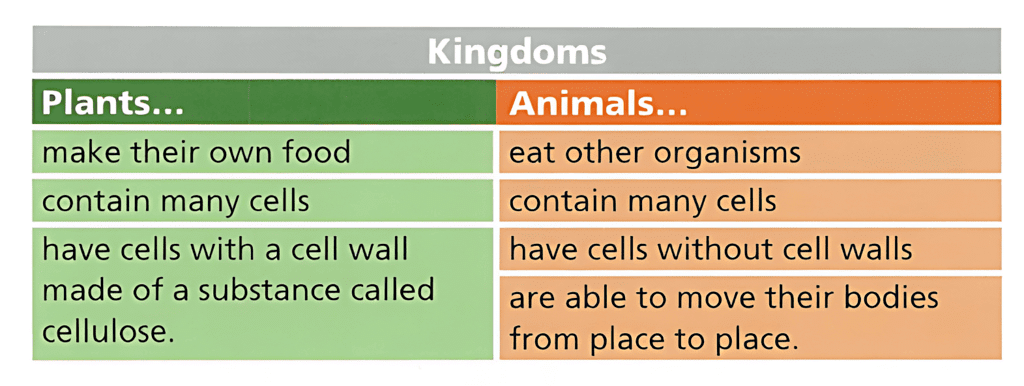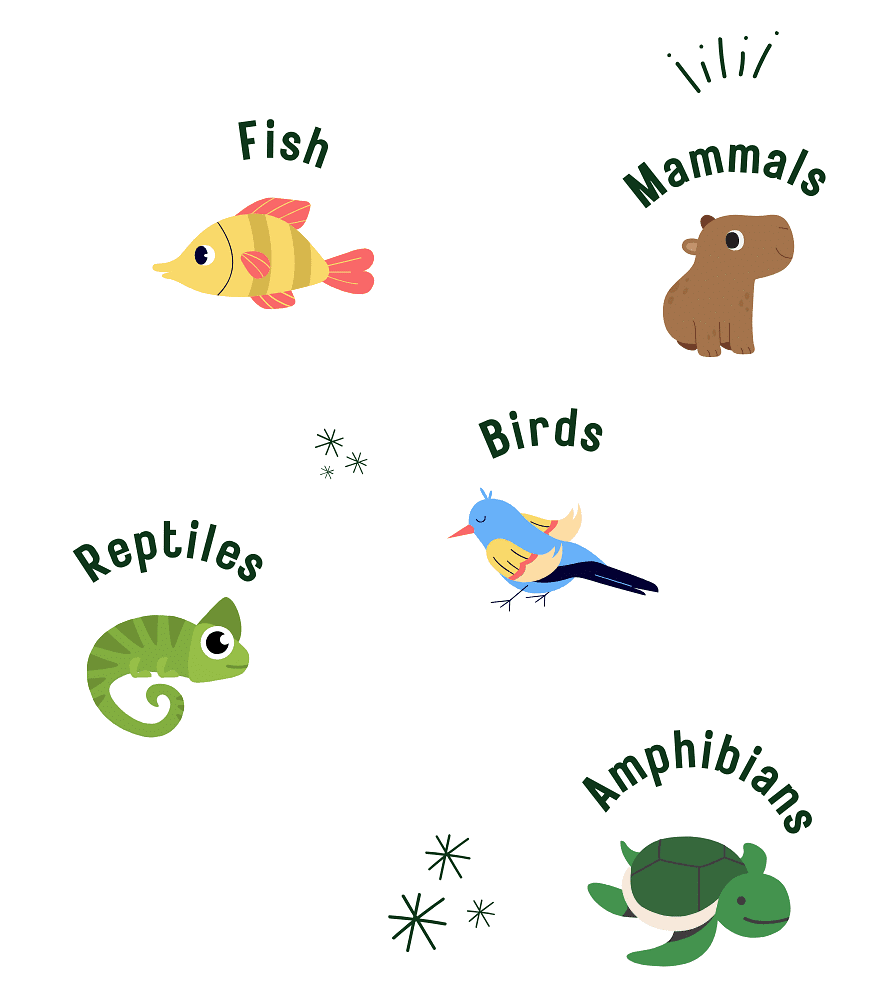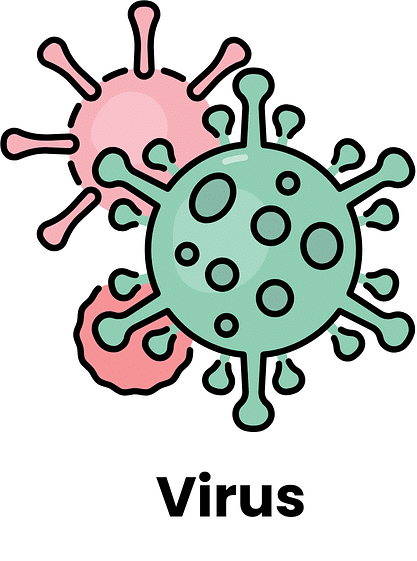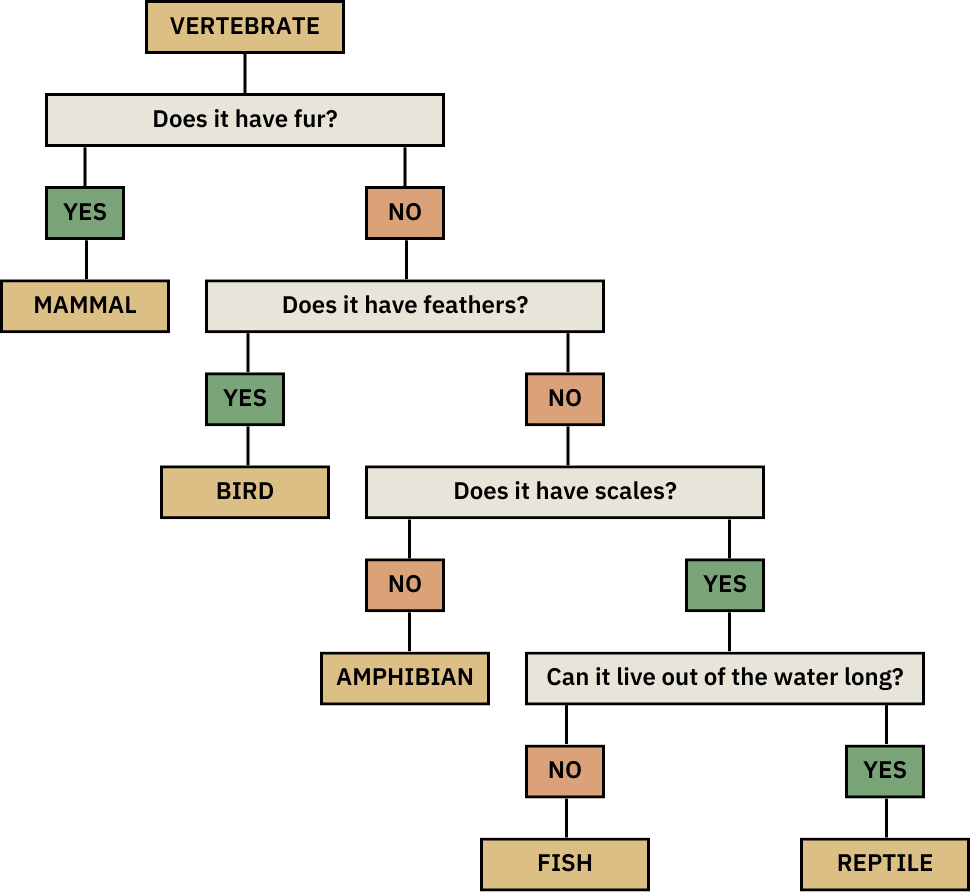Class 7 Exam > Class 7 Notes > IGCSE Cambridge Science for Year 7 > Chapter Notes: Classification
Classification Chapter Notes | IGCSE Cambridge Science for Year 7 - Class 7 PDF Download
Classifying Animals
Variation of Characteristics
- Scientists group organisms based on similarities and differences - a process called classification.
- Every organism has distinct features or characteristics that may vary between different organisms.
- Variation in characteristics helps recognize and differentiate between organisms.
Kingdoms
- Kingdoms are the largest groups of organisms (e.g., plant kingdom, animal kingdom).
- Characteristics used to classify plants and animals include cellular features visible under a microscope.
- Other kingdoms include the fungus kingdom (mushrooms, yeasts) and the prokaryote kingdom (bacteria).

Vertebrates and Invertebrates
- The animal kingdom is divided into vertebrates (with a backbone) and invertebrates (without a backbone).
- Vertebrates are further classified into five groups: mammals, reptiles, fish, amphibians, and birds, based on specific characteristics.
 Vertebrates
Vertebrates
Carl Linnaeus
- Swedish scientist Carl Linnaeus developed a system to classify living things into smaller groups based on variations in characteristics.
- The smallest group in this system is called a species, identified by a two-word Latin name.
Question for Chapter Notes: ClassificationTry yourself: What is the largest group of organisms called?View Solution
Species
- Organisms of the same species share very similar characteristics but exhibit variation.
- Members of the same species can reproduce and produce fertile offspring.
- Offspring produced by members of different species are called hybrids and are usually infertile.
Viruses

- Viruses are not considered living organisms as they lack the seven life processes (movement, reproduction, sensitivity, growth, respiration, excretion, nutrition).
- Viruses can only replicate inside a host cell by taking over its genetic machinery.
- Viruses cannot move any part of themselves and so require other things to move them.
- We do not know if viruses can detect changes around them. They are very simple structures, so it is unlikely.
- Viruses do not grow bigger and they require respiration by the host cell to supply the energy for replication.
- Viruses do not excrete waste and they rely on the food substances inside a host cell to build the new virus particles.
- Some scientists consider the combination of a virus and its host cell as a living entity.
Biological keys
Dichotomous Keys
- Dichotomous keys are tools used by scientists to identify organisms based on a series of questions with two possible answers, dividing them into smaller groups.
- The process involves answering each question sequentially to narrow down the identification.

Dichotomous Keys
Question for Chapter Notes: ClassificationTry yourself: Which of the following statements is true about organisms of the same species?View Solution
Using Keys to Classify Plants
- Within the plant kingdom, major groups include flowering plants, conifers, ferns, and mosses, classified based on characteristics like seed production, roots, and leaf structures.
- Leaf characteristics (edges, shape, arrangement) are often useful for identifying specific trees or plants.
The document Classification Chapter Notes | IGCSE Cambridge Science for Year 7 - Class 7 is a part of the Class 7 Course IGCSE Cambridge Science for Year 7.
All you need of Class 7 at this link: Class 7
|
32 videos|61 docs|22 tests
|
FAQs on Classification Chapter Notes - IGCSE Cambridge Science for Year 7 - Class 7
| 1. What are biological keys used for in the classification of animals? |  |
Ans. Biological keys are used to help classify animals by providing a series of questions or characteristics that help identify and categorize different species based on their unique features.
| 2. How do scientists use biological keys to classify viruses? |  |
Ans. Scientists use biological keys to classify viruses by examining their genetic material, structure, and mode of replication to determine their relationships to other known viruses and categorize them accordingly.
| 3. Why is it important to classify animals accurately using biological keys? |  |
Ans. Accurate classification of animals using biological keys helps scientists understand the relationship between different species, track evolutionary patterns, and predict the behavior and characteristics of unknown species based on similar traits.
| 4. Can biological keys be used to classify extinct animals? |  |
Ans. Yes, biological keys can be used to classify extinct animals by examining fossils, genetic material, and other remains to determine their characteristics and place them within the appropriate taxonomic categories.
| 5. How do biological keys differ from traditional classification methods? |  |
Ans. Biological keys differ from traditional classification methods by providing a systematic and standardized approach to categorizing animals based on specific characteristics, making it easier to identify and differentiate between different species.
Related Searches
















